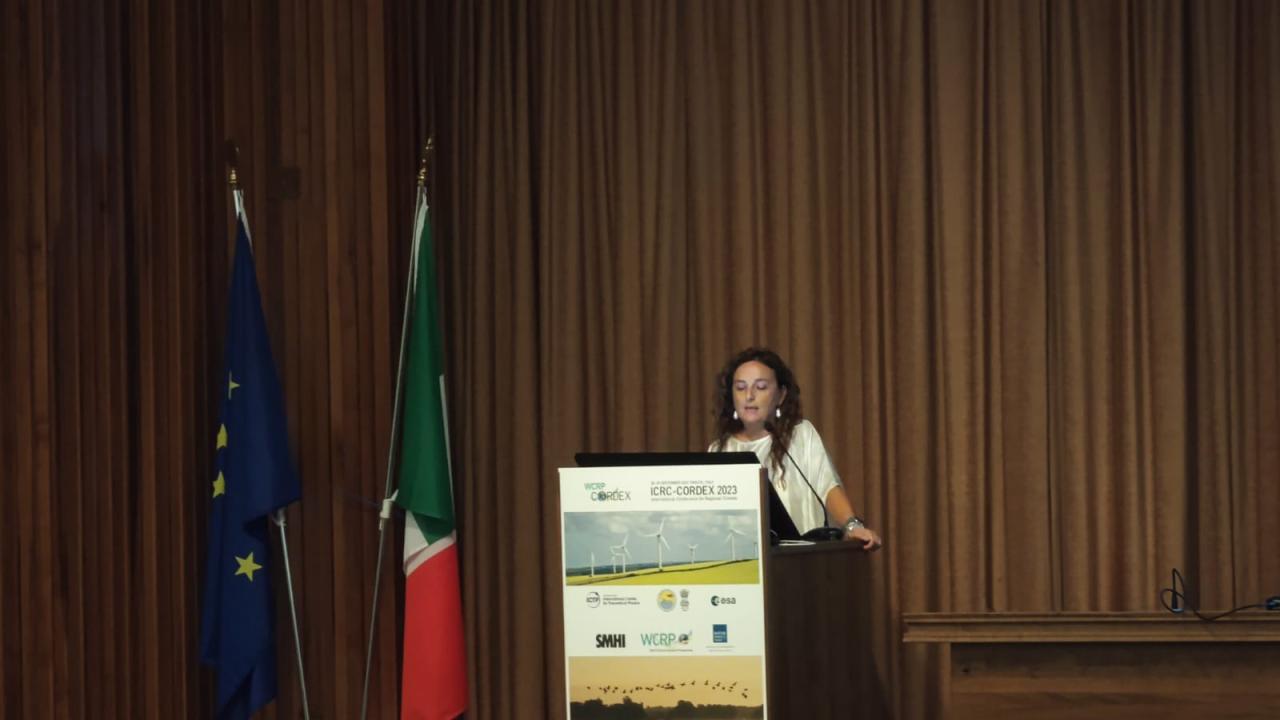
Erika Coppola, a Research Scientist in the ICTP Earth System Physics section, has been chosen as a Coordinating Lead Author for the Seventh Assessment Report (AR7) of the Intergovernmental Panel on Climate Change (IPCC). She is one of 664 experts from 111 countries selected by the IPCC from a global pool of 3,771 nominees.
Coppola, whose work focuses on regional climate and high-resolution climate models, will contribute to the report of Working Group I, in charge of assessing the physical science of climate change, and particularly to its chapter focussing on regional climate projections and extremes. She is the only Italian in a group of 19 lead authors from across the world who will contribute to the chapter.
The group's role will be to provide an updated, comprehensive and objective assessment of regional projections. “Understanding how today’s choices can shape tomorrow’s climate at the regional level is both a challenge and a necessity, essential to prepare for adaptation and mitigation. I am truly proud and honoured to have been selected for this task and I look forward to working with outstanding colleagues from around the world,” she says.
Coppola participated also in the previous assessment cycle of the IPCC as a lead author of the chapter on climate change information for regional impact and risk assessment, as part of Working Group I. In 2024 she was among the 80 experts who took part in the scoping meeting for the Special Report on Climate Change and Cities that will be part of AR7.
Coppola and her fellow authors will now start their assessment of relevant literature to draft their contributions to the report, based on the outline agreed upon by the IPCC earlier this year. As a Coordinating Lead Author, she will have to make sure that the chapter includes contributions from all the authors and that their views are taken into account and respected in all the decisions that the group will have to take during the drafting process. She will also liaise with the co-chairs of Working Group I, who will coordinate the full report, and make sure that the chapter will be delivered.
Asked what she hopes that this assessment cycle will achieve, Coppola says: “The first point of the previous report stated that human activities have unequivocally caused global warming—that was unprecedented. The next step will be to acknowledge that climate change is already happening and is affecting us all, it is not limited to a specific region.”
“More specifically, regarding our chapter, I will be happy if we can use this assessment cycle to close the research gaps we saw in the previous one, and if we do so across all regions. Unfortunately, the knowledge we have is not equal in different parts of the world, but I hope to see that we have been able to make some advancements everywhere,” Coppola adds.
The three IPCC Working Group reports, which will also assess the impacts, adaptation and vulnerabilities related to climate change, and the possible mitigation options, will start appearing in mid-2028. The last piece of AR7 will be the Synthesis Report—which includes a summary for policy makers with the main conclusions reached by the three working groups and by the experts working on the special reports. It will be approved by late 2029.
The IPCC takes particular care in ensuring that the authors and reviewers of the report constitute a diverse group in terms of both gender balance and geographical representation. In this cohort, more than half (51 per cent) come from developing countries and countries with economies in transition. Nearly half of the authors (46 per cent) are female scientists. The nominations of all appointed authors have been reviewed under the IPCC’s Conflict of Interest process, and the authors have accepted their invitations.
The Intergovernmental Panel on Climate Change (IPCC) is the UN body for assessing the science related to climate change. It was established by the United Nations Environment Programme (UNEP) and the World Meteorological Organization (WMO) in 1988 to provide political leaders with periodic scientific assessments concerning climate change, its implications and risks, as well as to put forward adaptation and mitigation strategies. In the same year the UN General Assembly endorsed the action by the WMO and UNEP in jointly establishing the IPCC. It has 195 member states.
About the IPCC Seventh Assessment Cycle
The IPCC publishes comprehensive scientific assessment reports of the climate every 5 to 7 years and is currently in its seventh assessment cycle, which formally began in 2023. In this cycle the Panel will produce three Working Group contributions to the Seventh Assessment Report (AR7), namely the Working Group I report on the Physical Science Basis, the Working Group II report on Impacts, Adaptation and Vulnerability and the Working Group III report on Mitigation of Climate Change. The Synthesis Report of the Seventh Assessment Report will be produced after the completion of the Working Group reports and released by late 2029. The Panel agreed on the outlines of the three Working Group contributions to the Seventh Assessment Report (AR7) in February 2025. The current assessment cycle will also include a Special Report on Climate Change and Cities and a Methodology Report on Short-lived Climate Forcers. Scientists have also been asked to deliver a Methodology Report on Carbon Dioxide Removal Technologies and Carbon Capture, Utilization and Storage.
















